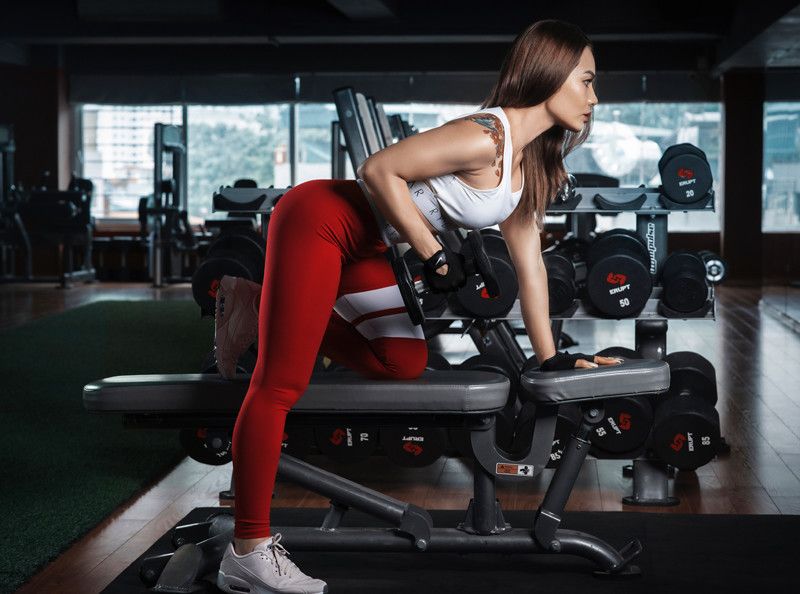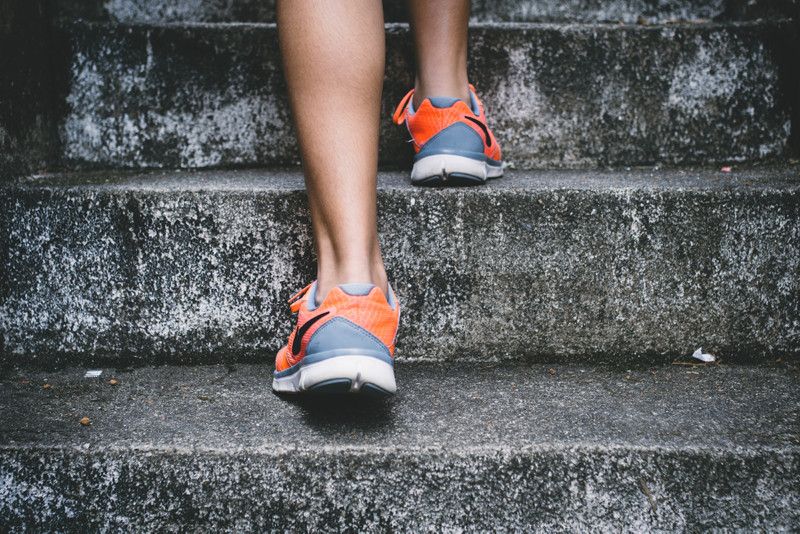How to Stay Fit While Traveling | Simple Diet & Workout Options
How to stay fit, maintain muscle, strength train, and eat healthy while traveling. Tips on protein intake, food planning, and working out while on the move.

For any gym-goer or fitness fanatic, going backpacking or traveling abroad comes with some serious lifestyle questions. Mainly speaking, "how do I keep fit while I'm traveling?"
Back home, you've got your routine down pat, diet under control, and you're looking good. When you travel though, it threatens all of your progress. This is a thought that most of the fitness community will have when going off on a travel adventure - luckily this isn't true.
Deviating from your routine, trying different authentic foods, and keeping active in different ways is all a part of the experience of travel. You shouldn't be worried or anxious about this, you should be excited.
Keeping fit isn't that difficult. Muscle mass is hard to lose, and putting on fat is also difficult. You would have to let yourself go completely and really binge on everything for an extended period to see a massive difference.
That being said, there are plenty of things you can do to keep fit. The fundamental things to watch out for (but not obsess over) are; food variety, protein intake, alcohol & sugar consumption, cardio, calisthenics, strength training, and sleep.
Focusing on a handful is very much manageable, and we go into the details below.
Eating Healthy While Traveling
This can be a massive struggle while traveling but it's not impossible, in fact, it's very doable. Whether your goal is keeping fat low, or maintaining muscle mass, you'll be able to do it while traveling.
It won't be like home. You won't have perfect macros, you won't always have access to protein shakes, or superfoods. In fact, a lot of the local cuisine will be heavy in oil, fat, and carbs.
But this is the fun part of traveling, you should embrace it. All you have to do is keep a few things in mind to maintain a healthy diet that hits everything you need while on the road.
- Restricting excessive sugar and alcohol consumption
- Getting all vitamins and minerals necessary for the day
- Eating enough protein to maintain muscle mass
- Drinking a lot of clean water every day
- Common sense dietary decisions (avoiding high caloric foods/portions)
Follow these and you'll not only stay fit, but you'll avoid getting sick. That's everything you can hope for while traveling.
Restricting Sugar & Alcohol
Sugar and alcohol are the top culprits in falling into the weight gain trap while traveling. Say you're in Thailand, so you get mango sticky rice, a fruit shake, or a bucket of cocktails (yes that's a thing) - all of this is heavy in sugar.
Sugar, in basic terms, if not burned off immediately will get stored as fat. By restricting sugar, and other empty carbs like alcohol, you'll be ahead of the game.
It's difficult because most things you do while traveling will have a 'vacation' component to it, and that's usually alcohol or sugar if we're consuming something. Gelato in Italy, bubble tea in Taiwan, cocktails on a beach somewhere in Croatia, and just generally everything in Asia as a whole.
You and I both know that eating/drinking these is unavoidable. So following a few simple tips can help immensely help even if we're consuming these as a part of our day to day intake.
- Be active while having your sugar - if you're walking around in the heat with your ice cream, or playing beach volleyball and stopping to have some of your cocktail every now and again, you'll be fine as you're burning it off immediately.
- Have a few days on, and a few days off when it comes to alcohol - If you're traveling long term take even more time off. Don't drink every single day, don't make it a habit. Having a few days on is much more fun, and something to look forward to anyway.
- Ask for no sugar - This is a real issue in Asia where any smoothie or shake you get, they'll add extra sugar to it right in front of you as sugar water. If you're having a fruit or vegetable shake, it defeats the purpose. It already tastes great without.
- Buy smaller servings or lowest caloric options - Do one scoop of ice-cream, no sugar in your coffee, a smoothie every other day, vodka soda instead of a beer.
Getting Your Vitamins & Minerals
Variety is key here and luckily for you, you're in a different country with a ton of local and international cuisine. Making sure that you eat those different foods will ensure you get every vitamin and mineral you need.
It won't be perfect. But as long as you don't stick with one thing, you'll do very well in this domain. When in Japan, don't just eat ramen. When in Germany, don't just have bratwurst.
Make sure your meals are different when it comes to the ingredients. Change up the macro-nutrient mix. If you had a heavily carb-based lunch, have a fiber and protein-rich dinner.
Another big one for "nutritional insurance," are vitamin tablets. You'll be able to find cheap dissolvable tablets from any pharmacy or corner store wherever you go. These are great to make sure you get anything you missed - but they're not a substitute for your diet
If you're feeling a bit off, and you think it's because of diet, it's usually because of a lack of vegetables, fruit, or water. Have these down and you'll be feeling better.
Eating Enough Protein
This is a big one if you're all about strength training and muscle mass. We'll talk more about strength training and maintenance in the working out section, but it's important to have this down pat from a diet perspective.
A lot of the time abroad, you'll be getting excessive carbs and not enough protein. Meatballs and pasta will be more pasta than meatballs, a chicken wrap will be more wrap than chicken.
This is where you'll need to seek out the best protein sources depending on the area, and consume enough.
- If you do strength training - consume a 0.7-0.8 grams per pound or 1.5-1.65 grams per kilo of body weight. This is how you'll maintain your mass.
- If you don't do strength training - consume the RDI for your weight which is about half of what we mentioned above.
Where are the easiest and most effective places to get protein abroad? Whether it's upping your intake or actually finding protein powder, there're multiple ways to go about doing it.
- Food market snacks - In Asia especially, you'll come across food markets that will have a lot of snacks that are predominantly meat. Chicken, pork, and seafood skewers, chicken/tofu stir fry, dumplings packed with protein - these are your friends.
- Ready-made protein shakes - More and more convenience stores, supermarkets, and other shops are selling protein shakes. These usually have 20-30 grams in there but are packed full of sugar as well. So work it into whatever activity you're doing!
- Nuts, Legumes, Tofu - Some places will be predominantly meat everywhere you go, but others will have a lot of vegetarian cuisine. When you're in these places and meat isn't the default, make sure you're eating high protein substitutes like nuts, legumes, and tofu. Even in meat-heavy areas, try to add this into the mix.
Drinking Water
How can people mess this one up, right? 8 glasses or 2 liters a day. It's not that hard, but sometimes it just doesn't happen or you need to change it up a little. Here're are some things you should keep in mind.
- If the location is hot and humid, you'll likely need more water to prevent dehydration, so make sure to increase your intake.
- Balancing salts is important too. When you sweat a lot, you're losing a lot of sodium. This isn't usually a problem, but on the off chance you haven't had anything salty during the day, and you've had a lot of water, increase the salt.
- Make sure the water is clean - The first thing to do in a country when you land is to google whether you can drink the tap water. If it's not a resounding 'Yes,' definitely stick to the bottled water.
Working Out While Traveling
If you follow all of the eating well tips above, you're already more than halfway to staying fit while traveling - even if you do no exercise and just keep active in your day to day routine. But for some, that's not going to be enough - especially if you're looking to stay toned or keep the same muscle mass.
Cardio & Flexibility
The best thing about cardio and flexibility workouts is that it doesn't matter where you are, these are completely location independent. Here's a quick list.
- Running
- Swimming
- Cycling
- Skipping
- Hiking
- Yoga
- Pilates
You can always go for a run on the beach, streets, valleys, wherever you are. Add a skipping rope (weighs practically nothing), and you could add some intensity to your workout. Make sure you have shoes for these activities. Getting a pair you can use in multiple different settings is a plus, article on that below.

A lot of the time swimming, hiking, surfing, and other activities will be on your travel itinerary as well, all of which will give you a leg up in your fitness without you even trying to make it a part of your trip.
A lot of destinations will also have communities around Yoga and Pilates. However, not only do you not need an instructor for these, but you can do them right there in your hostel dorm or in a public park.
Integrating these things into your week 2-3 times is the difference between putting on weight, and keeping or even become toned.
Strength Training & Calisthenics
In terms of strength training, muscle maintenance, and calisthenics - there's also great potential for location independence.
There are many gyms all around the world where you can get a really cheap or reasonable day rate to train. There are some limitations to this, so keep these in mind.
- You're not in a single place for a long time
- There isn't a gym everywhere
- All gyms don't do day rates/passes
To be cost-effective, and realistic while traveling, you need to adjust your workout routine. Finding a gym to do a full-body heavy lifting session once or twice a week is your best option.
Yes, back at home you might be going 3-6 times a week, you might have a split that's push, pull, legs, hell you might have a HIIT training regimen. But while traveling, we're all about muscle maintenance because that's the best we can do if we're constantly on the move.
Switching to a full-body workout, once or twice a week will ensure optimal performance and maintenance, so when you get back home and go back to your old routine - you're ace 👍
There are some limitations to the gym life though.
Like we mentioned before, some places don't do day rates, or are simply too expensive. Sometimes you won't find a gym at all - when you can't find a gym, calisthenics is your best friend.
If you have something to do pull-ups on, you'll be able to work your back and biceps. And if you can work your back and biceps, you're all set. The rest you can do with your body and floor alone.
- Chest and Triceps
Push ups: wide, close, one arm, incline
Dips
Muscle-up - Back and Biceps
Pull ups: wide, close, overhand, underhand, muscle-up - Abs
Crunches: regular, bicycle
Sit-ups - Legs
Squats: regular, split
Lunges
Mixing it up, watching a few tutorials and seeing what works for you, and what doesn't is how you'll get better at this.
Don't underestimate how effective this can be while traveling. Not only for convenience but for results in terms of endurance, and working stabilizers that you miss when you're back home. You'll be surprised at what you decide to integrate when you get back 😎
Other Considerations
It's not only about what you put in your body, and how you work your body, but it's also how you treat your body when it comes down to fitness - especially when traveling. What do I mean by this?
- Sleep, Rest & Recovery - You'll have tiring days and if you don't take the time to stop and rest, you'll definitely see the effects of it on your fitness.
- Massages - You'll be tense from all the activity, incidental and otherwise. Hiking, surfing or even walking for long periods. It's a great opportunity to get massages to help you loosen up the muscles for faster recovery.
- Mental health - Meditating, taking some alone time, recounting your adventures, and writing in a journal will all have significant physical effects as well. When you're stressed and anxious there is a very real physical tax.
Here's a helpful article if you want to look further into all of this:

If you follow the steps above, pay attention to what you eat, make sure you get the right amount of protein and vitamins - you'll most definitely keep fit while traveling.
You can even improve how toned you are and maintain (or improve) muscle mass if you follow a basic workout routine as well.
I hope these tips and strategies help you out!
Best of luck,
Sah

